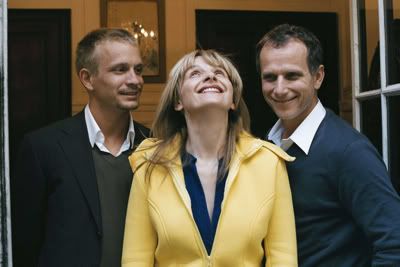
Pictured (from left to right): Jeremie Renier, Juliette Binoche, Charles Berling
It is a shared belief among many a writer that a person’s true nature is best seen through his or her coping mechanisms. Indeed, the death of a loved one is probably the most direct route by which one can discover what is truly important both emotionally and materially speaking. Such is the thematic backbone of Olivier Assayass’ hypnotically restrained Summer Hours.
The plot follows the siblings Marly: Frederic (Charles Berling), the eldest, Adrienne (Juliette Binoche), and Jeremie (Jeremie Renier), the youngest, as they cope with the death of their mother Helene while attempting to decide what to do with her extensive and valuable art collection. Frederic is a romantic, believing that it is in everyone’s best interest to preserve their mother’s idyllic country home for future generations to enjoy and act as a kind of home base for the family. Adrienne and Jeremie, however, find their lives taking them abroad, Adrienne to New York to be with her American fiancé, and Jeremie to China as a move up the corporate ladder with no use for the house but a need for the financial stability selling it would create. Yet Frederic remains loyal, unable to part with the objects and locations that defined him as a child and that he desperately wishes would define him as an adult.
Despite the film’s ebb and flow that does indeed evoke a feeling similar to that of a cool summer’s day, there is an underlying magnitude assigned to these objects and to the mother’s life in general that gives the film its richness. In several moments throughout the film it is alluded that Helene had a relationship with her uncle, the artist whose work adorns the house, that went beyond affectionate relatives. Adrienne and Jeremie have already made their peace with this notion, but Frederic cannot nor does he want to wrap his head around such an idea. When their lawyer describes to him that Helene was the artist’s “last great passion,” Frederic assumes the least offensive definition for that term. However we can understand his decision to do so, as he so dearly holds this place to his heart. To learn that it contains secrets even he cannot unravel would naturally come as a hindrance to his need for preservation.
It is this idea, this need for preservation, that makes the ending so perplexing to me. Without going into too much detail, I found it quite troubling to see this beautifully intricate study of three adults finally coming of age boil down to a message of little more than “kids these days.” The last image pulls it enough out of this rut to be satisfying, but I confess it did leave me with an unpleasant taste in my mouth. That aside, the rest of the film is fascinating enough that it is more than worth the watch.
NOTE: Of course, with any quality foreign film, an American remake is bound to happen. Tom Hanks snapped up the option for this almost immediately after it came out. The main issue I have with this is that there is something about this film that is unique to France. I’m sorry but I don’t know of anywhere in the United States that can truly mimic the feeling of a lush garden home in Provence. This is also annoying because let's face it, there is a 99% certainty that Hanks is going to cast himself as Frederic (or whatever 'American' name they give him).
No comments:
Post a Comment